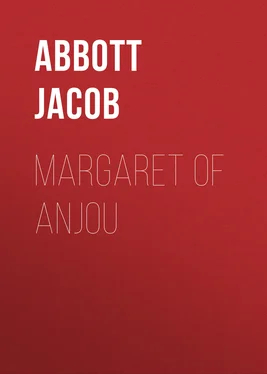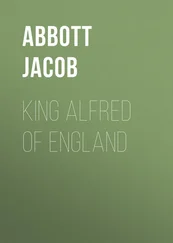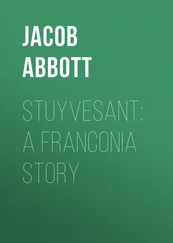Jacob Abbott - Margaret of Anjou
Здесь есть возможность читать онлайн «Jacob Abbott - Margaret of Anjou» — ознакомительный отрывок электронной книги совершенно бесплатно, а после прочтения отрывка купить полную версию. В некоторых случаях можно слушать аудио, скачать через торрент в формате fb2 и присутствует краткое содержание. Жанр: foreign_prose, История, foreign_edu, foreign_antique, на английском языке. Описание произведения, (предисловие) а так же отзывы посетителей доступны на портале библиотеки ЛибКат.
- Название:Margaret of Anjou
- Автор:
- Жанр:
- Год:неизвестен
- ISBN:нет данных
- Рейтинг книги:3 / 5. Голосов: 1
-
Избранное:Добавить в избранное
- Отзывы:
-
Ваша оценка:
- 60
- 1
- 2
- 3
- 4
- 5
Margaret of Anjou: краткое содержание, описание и аннотация
Предлагаем к чтению аннотацию, описание, краткое содержание или предисловие (зависит от того, что написал сам автор книги «Margaret of Anjou»). Если вы не нашли необходимую информацию о книге — напишите в комментариях, мы постараемся отыскать её.
Margaret of Anjou — читать онлайн ознакомительный отрывок
Ниже представлен текст книги, разбитый по страницам. Система сохранения места последней прочитанной страницы, позволяет с удобством читать онлайн бесплатно книгу «Margaret of Anjou», без необходимости каждый раз заново искать на чём Вы остановились. Поставьте закладку, и сможете в любой момент перейти на страницу, на которой закончили чтение.
Интервал:
Закладка:
Death of Bedford.
Things went on tolerably well after this for many years; that is, there were no more open outbreaks, though the old jealousy and hatred between Gloucester and the cardinal still continued. The influence of the Duke of Bedford held both parties in check as long as the duke lived. At length, however, when the young king was about fourteen years old, the Duke of Bedford died. He was in France at the time of his death. He was buried with great pomp and ceremony in the city of Rouen, which had been in some sense the head-quarters of his dominion in that country, and a splendid monument was erected over his tomb.
Anecdote.
A curious anecdote is related of the King of France in relation to this tomb. Some time after the tomb was built Rouen fell into the hands of the French, and some persons proposed to break down the monument which had been built in memory of their old enemy; but the King of France would not listen to the proposal.
Generosity of the French king.
"What honor shall it be to us," said he, "or to you, to break down the monument, or to pull out of the ground the dead bones of him whom, in his life, neither my father nor your progenitors, with all their power, influence, and friends, were ever able to make flee one foot backward, but who, by his strength, wit, and policy, kept them all at bay. Wherefore I say, let God have his soul; and for his body, let it rest in peace where they have laid it."
Coronation of the young king in France.
When King Henry was old enough to be crowned, in addition to the English part of the ceremony, he went to France to receive the crown of that country too. The ceremony, as is usual with the French kings, was performed at the town of St. Denis, near Paris, where is an ancient royal chapel, in which all the great religious ceremonies connected with the French monarchy have been performed. A very curious account is given by the ancient chroniclers of the pageants and ceremonies which were enacted on this occasion. The king proceeded into France and journeyed to St. Denis at the head of a grand cavalcade of knights, nobles, and men-at-arms, amounting to many thousand men, all of whom were adorned with dresses and trappings of the most gorgeous description. At St. Denis the authorities came out to meet the king, dressed in robes of vermilion, and bearing splendid banners. The king was presented, as he passed through the gates, "with three crimson hearts, in one of which were two doves; in another, several small birds, which were let fly over his head; while the third was filled with violets and flowers, which were thrown over the lords that attended and followed him."
At the same place, too, a company of the principal civic dignitaries of the town appeared, bearing a gorgeous canopy of blue silk, adorned and embroidered in the most beautiful manner with royal emblems. This canopy they held over the king as he advanced into the town.
Curious pageants.
At one place farther on, where there was a little bridge to be crossed, there was a pageant of three savages fighting about a woman in a mimic forest. The savages continued fighting until the king had passed by. Next came a fountain flowing with wine, with mermaids swimming about in it. The wine in this fountain was free to all who chose to come and drink it.
Then, farther still, the royal party came to a place where an artificial forest had been made, by some means or other, in a large, open square. There was a chase going on in this forest at the time when the king went by. The chase consisted of a living stag hunted by real dogs. The stag came and took refuge at the feet of the king's horse, and his majesty saved the poor animal's life.
The coronation.
Thus the king was conducted to his palace. Several days were spent in preliminary pageants and ceremonies like the above, and then the coronation took place in the church, the king and his party being stationed on a large platform raised for the purpose in the most conspicuous part of the edifice.
1441. The banquet.
After the coronation there was a grand banquet, at which the king, with his lords and great officers of state, sat at a marble table in a magnificent ancient hall. Henry Beaufort, the Bishop of Winchester, was the principal personage in all these ceremonies next to the king. Gloucester was very jealous of him, in respect to the conspicuous part which he took in these proceedings.
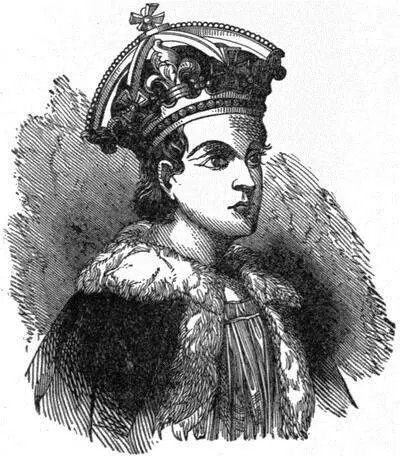
Henry VI. in his Youth.
Henry was quite young at the time of his coronations. He was a very pretty boy, and his countenance wore a mild and gentle expression.
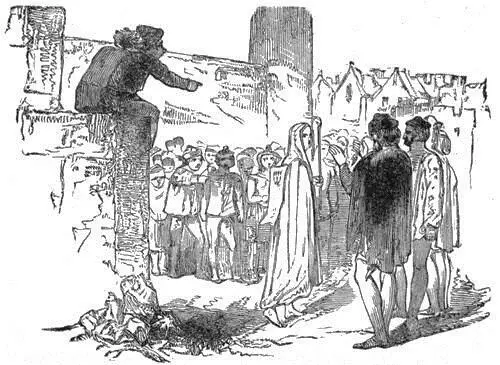
The Penance.
The old quarrel broke out again. The duchess's penance.
The quarrel between the Duke of Gloucester and the bishop was kept, in some degree, subdued during this period, partly by the influence of the Duke of Bedford while he lived, and partly by Gloucester's mind being taken up to a considerable extent with other things, especially with his campaigns in France; for he was engaged during the period of the king's minority in many important military expeditions in that country. At length, however, he came back to England, and there, when the king was about twenty years of age, the quarrel between him and the bishop's party broke out anew. The king himself was, however, now old enough to take some part in such a difficulty, and so both sides appealed to him. Gloucester made out a series of twenty-four articles of complaint against the bishop. The bishop, on the other hand, accused the duke of treason, and he specially charged that his wife had attempted to destroy the life of the king by witchcraft. The duchess was condemned on this charge, and it is said that, by way of penance, she was sentenced to walk barefoot through the most public street in London with a lighted taper in her hand. Some other persons, who were accused of being accomplices in this crime, were put to death.
Witchcraft.
The witchcraft which it was said these persons practiced was that of making a waxen image of the king, and then, after connecting it with him in some mysterious and magical way by certain charms and incantations, melting it away by degrees before a slow fire, by which means the king himself, as was supposed, would be caused to pine and wither away, and at last to die. It was universally believed in those days that this could be done.
Position of the king.
Of course, such proceedings as these only embittered the quarrel more and more, and Gloucester became more resolute and determined than ever in prosecuting his intrigues for depriving the bishop of influence, and for getting the power into his own hands. The king, though he favored the cardinal, was so quiet and gentle in his disposition, and so little disposed to take an active part in such a quarrel, that the bishop could not induce him to act as decidedly as he wished. So he finally conceived the idea of finding some very intelligent and capable princess as a wife for the king, hoping to increase the power which he exercised in the realm through his influence over her.
Scheme formed by Beaufort.
The lady that he selected for this purpose was Margaret of Anjou.
CHAPTER IV.
Margaret's Father and Mother
1420. Provinces of France.
In former times, the territory which now constitutes France was divided into a great number of separate provinces, each of which formed almost a distinct state or kingdom. These several provinces were the possessions of lords, dukes, and barons, who ruled over them, respectively, like so many petty kings, with almost absolute sway, though they all acknowledged a general allegiance to the kings of France or of England. The more northern provinces pertained to England. Those in the interior and southern portions of the country were under the dominion of France.
Читать дальшеИнтервал:
Закладка:
Похожие книги на «Margaret of Anjou»
Представляем Вашему вниманию похожие книги на «Margaret of Anjou» списком для выбора. Мы отобрали схожую по названию и смыслу литературу в надежде предоставить читателям больше вариантов отыскать новые, интересные, ещё непрочитанные произведения.
Обсуждение, отзывы о книге «Margaret of Anjou» и просто собственные мнения читателей. Оставьте ваши комментарии, напишите, что Вы думаете о произведении, его смысле или главных героях. Укажите что конкретно понравилось, а что нет, и почему Вы так считаете.
